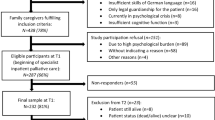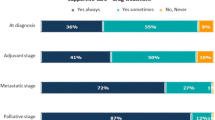Abstract
Background
The first step in effective supportive care delivery is an assessment of patient needs. The Initial Health Assessment Form (IHA) was developed to aid clinicians in recognition and documentation of a patient's supportive care needs during their first visit to a comprehensive cancer centre. The purpose of this study was to determine the relative effectiveness of this instrument as compared to routine practice.
Methods
A before-after study was performed. Charts of consecutive patients with newly diagnosed cancer attending the Hamilton Regional Cancer Centre were selected randomly. Each chart was reviewed to determine the documentation at the initial patient assessment of 22 supportive care items under eight domains of need: physical, psychological, daily living, social, financial, informational, special needs and personal resources. The pre-intervention evaluation (T1) occurred over a 3-month period followed by the introduction of the IHA into clinical practice. Three months after its introduction, the post-intervention (T2) evaluation took place over the ensuing 3 months.
Results
A total of 306 charts were evaluated (153 each in T1 and T2). Patients from the two time periods were comparable with respect to background demographic variables. Introduction of the IHA increased the mean documentation of supportive care needs and resources from 26% in T1 to 49% in T2 (p=0.001). Significant improvements were found in all domains of need. Despite improvements, documentation of assessment continued to remain low for daily living, social, financial, and informational needs.
Conclusions
The IHA improved documentation of supportive care needs and resources. There is still room for improvement.
Similar content being viewed by others
References
Fitch M (2000) Supportive care for cancer patients. Hosp Q 3:39–46
Ashbury F, Findlay, H, Reynolds B, McKerracher K (1998) A Canadian survey of cancer patients' experiences: Are their needs being met? Journal of Pain and Symptom Management 16:298–306
Vachon M, Lancee W, Ghadirian P, Adair W, Conway B (1991) Final report on the needs of person living with cancer in Quebec. Quebec Division of the Canadian Cancer Society
Vachon M, Lancee W, Conway B, Adair W (1990) Final report on the needs of persons living with cancer in Manitoba. Manitoba Division of the Canadian Cancer Society
Vachon M, Conway B, Lancee W (1989) The needs of people living with cancer in Prince Edward Island. Prince Edward Island Division of the Canadian Cancer Society
Gray R, Klotz L, Iscoe N, Fitch M, Franssen E, Johnson B, et al (1997) Results of a survey of Canadian men with prostate cancer. Can J Urology 4:165-171
Addington-Hall JM, Weir MW, Zollman C, McIllmurray MB (1993) A national survey of the provision of support services for people with cancer. BMJ 306:1649–1650
Coluzzi PH, Grant M, Doroshow JH, Rhiner M, Ferrel B, Rivera L (1995) Survey of the provision of supportive care services at National Cancer Institute-designated cancer centres. J Clin Oncology 13:756–764
Whelan T, Mohide EA, Willan A, Arnold A, Tew M, Sellick S, et al. (1997) The supportive care needs of newly diagnosed cancer patients attending a regional cancer centre. Cancer 80:1518–1524
Fallowfield L, Jenkins V (1999) Effective communication skills are the key to good cancer care. European J Cancer 35:1592–1597
Marvel M, Epstein R, Flowers K, Beckman H (1999) Soliciting the patient's agenda: Have we improved? JAMA 281:283–287
Keller V, Carroll J (1994) A new model for physician patient communication. Patient Education and Counselling 23:131–140
Blue J (1988) New Directive for documentation review in radiation oncology. Radiotherapy Management 10:31–33
Christiaens M (1996) Documentation of a surgical procedure: A tool for quality assessment for breast conservative treatment. Anticancer Research 16:3955–3958
Davis M, De Santis D, Klemm K (1995) A flow sheet for follow-up after chemotherapy extravasation. Oncology Nursing Forum 22:979–983
Maniscalco R, Mitchell M, White L (1991) Medical record review in an employee cancer screening clinic. Quality Review Bulletin 5:167–169
Smith G, Richardson A (1996) Development of nursing documentation for use in the outpatient oncology setting. European J Cancer Care (Engl) 5:225–232
Steele S, Carruth A (1997) A comprehensive interdisciplinary chemotherapy teaching documentation flow sheet. Oncology Nursing Forum 24:907–911
Lomas J (1998) Teaching old (and not so old) dogs new tricks: Effective ways to implement research findings. Working paper 93–4 Centre for Health Economics and Policy Analysis, McMaster University
Kanouse DE, Jacoby I (1988) When does information change practitioners behaviour? Int J Technol Assess Health Care 4:27–33
Acknowledgements
The authors would like to thank Ms. Judy Hood for the preparation of the manuscript and Ms. Mary Ann O'Brien for helpful comments on an earlier draft.
Author information
Authors and Affiliations
Corresponding author
Additional information
Source of financial support: Ontario Ministry of Health and Long-Term Care, Health Systems Linked Research Unit Grant.
Rights and permissions
About this article
Cite this article
Crooks, D.L., Whelan, T.J., Reyno, L. et al. The Initial Health Assessment: an intervention to identify the supportive care needs of cancer patients. Support Care Cancer 12, 19–24 (2004). https://doi.org/10.1007/s00520-003-0526-9
Received:
Accepted:
Published:
Issue Date:
DOI: https://doi.org/10.1007/s00520-003-0526-9




